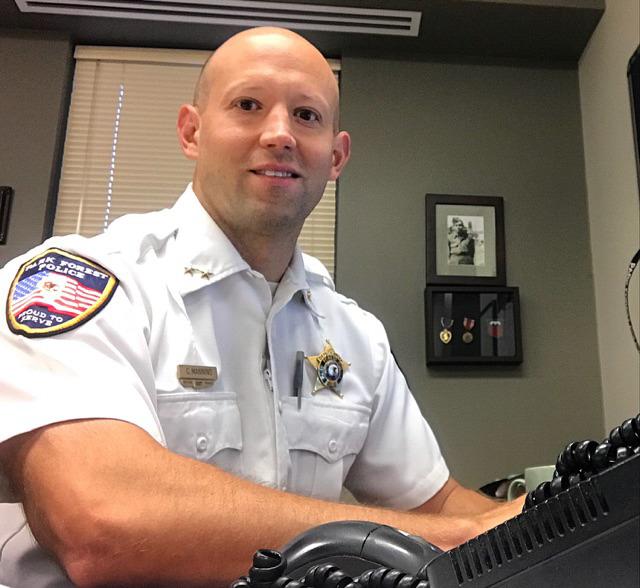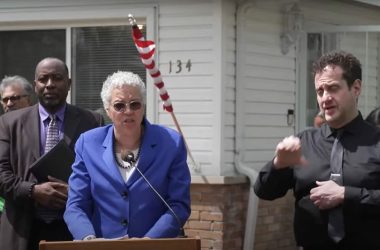
Park Forest, IL-(ENEWSPF)- It was September 11 when we spoke. We hadn’t done a proper interview since Police Chief Christopher Mannino was sworn in. The fault was mine there. I have always, always found the PFPD to be forthcoming when I’ve asked questions, and this request for an interview was no exception. My regret here was the obvious: it was 9/11 and I neglected to ask the chief for his reflections on 19 years since that incredible, frightening day in US history.
We will make that right next year.
This year, we spoke in the midst of a pandemic and just after the “Summer of George Floyd.” Park Forest Police assisted in three demonstrations in the immediate area, with Chief Mannino showing up as a participant in one in Chicago Heights.
Chief Mannino was quite focused for this interview. He always is — that was not rare. Chief Mannino carefully weighs his words. His social media posts often demonstrate his philosophical bent. He shared that side of his personality during our conversation. Chief Mannino exudes a warmth and thoughtfulness as well as a sincere commitment to those who live in and visit Park Forest.
So what of the pandemic and protests?
Apologies for my stammering at times in the video. Interviews like these betray that I once had a significant stutter.
Here’s our interview with the chief who is always professional and well-spoken.
ENEWSPF: We’re speaking with Chief Christopher Mannino of the Park Forest Police Department. Chief, thank you so much for taking the time. We are talking today on September 11th; it happens to be.
One of the things that I was curious about, we’re dealing with a pandemic and you’re dealing– the officers and the village dealing with that in a much different way different perspective through the years with the table-top drills and the rehearsals for disasters, whatever.
A train derailing, all kinds of different scenarios. Did you even plan for something like this?
Chief Mannino: When it comes to the table-top exercises, those tend to focus on a multi-agency response to a more physical type of a crisis such as you mentioned the train derailment. We’ve done active shooter threats, different kinds of threats in a public setting.
It tends to focus on those more active type situations. That said there was prior preparedness for pandemics specifically along the lines of potential vaccine distributions. That is something that has always been ongoing.
But when it comes to the actual game plan, the operational game plan for pandemics. There really wasn’t a game plan or a book to go by. We had to create policy as it went and especially because in this pandemic the information seemed to change, especially in the beginning, so quickly. We had to consistently update our policies and procedures to reflect the new best practices.
So, it was really a lot of calling audibles all along the way trying to make sure we were doing the best we could to protect our personnel while we still protected the people that we serve.
ENEWSPF: One of the things we’ve come to say here at the high school is we’re building the plane as we fly it so to speak. A lot of that has every day as you say has a new experience with this.
In light of the events of the summer, what has Park Forest– you have approached things differently I think through the years and have made an effort to reach out to many different community members.
How is that different with respect to race and anti-racism?
Chief Mannino: To be honest with you, Gary, I wouldn’t say that it’s any different. I would say that we’ve all along had a focus on cultural competency. So, while the events of the summer — the death of George Floyd was tragic and it was wrong — it didn’t change what we’re doing because we were already focused on ensuring we have good relationships in the community and that the type of policing we do is fair and impartial. So, I would say what we’re doing is a continuation of what we’ve been doing for at least the last several years here.
Mental Health Crises and the One Mind Campaign
NOTE: We spoke about mental health crises to which police are called to respond. Chief Mannino referenced the International Association of Chiefs of Police One Mind Campaign. In short, “The One Mind Campaign seeks to ensure successful interactions between police officers and people in crisis, people with mental health issues or people with intellectual and/or developmental disabilities. The initiative focuses on uniting local communities, public safety organizations, and mental health organizations so that the three become of one mind.”To join the campaign, law enforcement agencies must pledge to implement four promising practices over a 12-36 month time frame.
“These practices include:
- Establish a clearly defined and sustainable partnership with one or more community health organizations
- Develop and implement a model policy addressing law enforcement response to persons affected by mental illness
- Train and certify 100 percent of sworn officers (and selected non-sworn staff, such as dispatchers) in mental health awareness courses.”
Park Forest has met the 100% threshold.
More from Chief Mannino.
ENEWSPF: How have thing changed with respect to our police responding to mental health crises. You and I spoke a few year ago whenever you came on board as chief and we touched a little bit on the mental health that officers are called.
The resources in the area have vanished almost. What’s happening with training with officers and your response to mental health crises?
Chief Mannino: Well the International Association Chiefs of Police has a campaign called the One Mind Campaign. And that campaign has four basic steps that they want to see all of American law enforcement take to become more proficient at responding to those who may be in mental health crisis.
One of those is ensuring that at least 20% of your department is trained in crisis intervention team training. We were the first Illinois agency to complete the one mind campaign and we’ve exceeded that 20% to have it be 100% of our personnel who have over two year of service are crisis intervention trained.
The only reason those with less than two years of service aren’t CIT trained is because Illinois law doesn’t allow it. So, we’re at the maximum level of crisis intervention team training.
Additionally, those who have less than two years generally go to a one-day mental health awareness course. Then we also have periodic training either in-house or outside-resourced that is on various topics such as interacting with someone with autism or other mental health awareness topics.
ENEWSPF: Chief, is there anything else that you would like to say or the outreach of the departments through social media is, I think, unparalleled and is there anything else that you would want to say to members of the community during this time of pandemic crisis?
Chief Mannino: Well I guess there are a couple of things I want to say. First of all, going back to your question regarding cultural competency and just how we’re handling things. One of the things that I want to stress is that Illinois law says that every law enforcement officer has to have cultural competency training every three years.
And while that is an okay start that is nowhere near sufficient to ensure that everyone in law enforcement has a good grasp of the complexity of society and policing in a complex society.
We make sure that we have that training every single year and even then I would say a class along is not enough to make somebody culturally competent. It’s culture that does that. And so, our focus at the Park Forest Police Department is not just making sure we tick a box with mandated training.
It’s to make sure we have a culture of inclusiveness and a respect for life and a belief in fair and impartial policing. It’s not just a catchphrase. It’s something we fundamentally believe in. I think that if we want to see a better policing in America that it has to go beyond mandated training.
It has to be a cultural change, a way of a looking at policing that will bring about that change. It’s not a short-term goal, but it’s certainly achievable, and its done by, I believe, the leadership and the leadership believing in the principles of fair impartial policing.
Partnership: Policing With the Community
Then, I guess, lately this has been a year unlike anything I’ve ever seen in my time, and it’s been difficult on many levels. It’s been difficult to be in law enforcement. I also know it’s very difficult for many members of our community
I guess what I want to say is that what I love about policing in Park Forest is that we have a partnership with the community. I’ve never felt like we are policing the community, I’ve always felt like we’re policing with the community.
You see that by how many people are willing to call us when they see something suspicious or are willing to assist us when we are working on an issue. It’s a true partnership, and while I always think it could be strengthened, that partnership, I think, is what makes us a bit unique.
You know when all this unrest was going on, we had three peaceful protests that touched Park Forest. We assisted with all of them and there was no conflict. It was exactly how it’s supposed to be.
It was a perfect example of the use of First Amendment rights and a great example of law enforcement assisting our residents and those who participated in being a part of that. I think that is an ideal, I’m not saying we’re perfect or its perfect, but I think we have an ideal situation here in Park Forest.
I guess my message would be that we’ve gotten through it together so far, we’ll get through it together moving forward. Always working to have a stronger partnership. But I’m very thankful for the relationship that we have with our community here.
I would just reiterate we’re here to serve. We firmly believe that we are fortunate to be able to serve, to be able to do what we do, and we do it for the men and women and children who live in and visit Park Forest and we’re very happy to be able to do that.
ENEWSPF: Chief, thank you so much for your time. As always appreciate you giving time for our viewers. I appreciate that, thank you.
Chief Mannino: Thank you.








